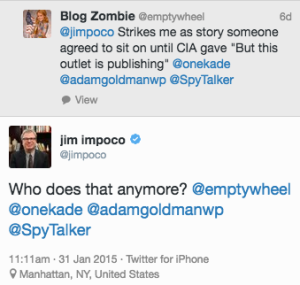 Almost exactly a week ago, the Washington Post reported on CIA’s role in the 2008 car bomb killing of the key Hezbollah planner behind the terrorist attack on the American Embassy in Lebanon in 1983, Imad Mugniyeh.
Almost exactly a week ago, the Washington Post reported on CIA’s role in the 2008 car bomb killing of the key Hezbollah planner behind the terrorist attack on the American Embassy in Lebanon in 1983, Imad Mugniyeh.
Shortly thereafter, Newsweek published an even more detailed version.
As everyone was discussing the story the next day, I suggested the timing made it seem as if one outlet — I was agnostic about which one — had sat on the story at the request of CIA. Newsweek’s editor, Jim Impoco, scoffed that anyone might do such a thing.
“Who does that anymore?” he asked.
Politico just confirmed that I was correct: Newsweek sat on the story for a year in response to a CIA request.
For a year, Newsweek held a story on the assassination of top Hezbollah operative Imad Mughniyeh at the CIA’s request, the magazine confirmed Friday — only to be scooped by The Washington Post last week.
The CIA made a forceful case for holding the story in conversations and a meeting at the agency’s headquarters in Langley, Va., and Newsweek honored that request, according to Editor-in-Chief Jim Impoco.
It was easy to guess CIA had asked someone to hold this story because it has become such a frequent occurrence.
As Condoleezza Rice made clear at the Jeffrey Sterling trial, when Administrations make such requests, they promise to tell the outlet that got the story first if someone else is honing in on the story, which leads to both publishing almost at once.
You have our promise that if we learn of any other news organization plans to publish this story we will let you know immediately. If any other organization gets this information we will work as hard to convince them not to publish as we are with you.
But look how such a promise worked with this story. CIA got the Post to hold their story for two-and-a-half weeks, but in that time, they tipped Newsweek, depriving the Post of some advantage for having decided to take the risk to publish.
On Friday, Jan. 30, the Post published its account of Imad Mugniyeh’s death and Newsweek soon followed – odd timing for a blockbuster national security story with global implications, including the potential to derail U.S. talks with Iran, Hezbollah’s chief patron.
The unusual timing was the result of competitive pressure – and the Post’s fear of getting scooped on a story it was eager to publish, multiple sources said.
The reason was that Impoco was tipped off that the Post was about to publish its version of how the terrorist mastermind had finally been brought down. And sure enough, late Friday, the Post’s story by reporters Adam Goldman and Ellen Nakashima went live.
Over at the Post, the story was held for two and a half weeks at the CIA’s request, according to a source at the newspaper. The CIA had asked for the delay to deal with certain circumstances and a schedule was mutually agreed upon.
The Post’s original plan was to post the story online on Saturday, Jan. 31 and feature it in the Sunday paper. But when the Post learned that the CIA had tipped off other outlets that the story would be coming out, the paper’s editors decided to publish it immediately, and the story went up around 10:00 p.m. on Friday night.
At some point, the CIA is going to lose credibility, playing these games all the time.
But thus far, apparently, it hasn’t.


